Myanmar's Suu Kyi hit with two new criminal charges

In this file photo taken on July 17, 2019, Myanmar's State Counsellor Aung San Suu Kyi speaks during the opening ceremony of the Yangon Innovation Centre in Yangon. . PHOTO/AFP.
What you need to know:
- Ousted Myanmar civilian leader Aung San Suu Kyi was hit with two new criminal charges when she appeared in court via video link on March 1, 2021, a month after a military coup triggered relentless and massive protests.
Ousted Myanmar civilian leader Aung San Suu Kyi was hit with two new criminal charges in a court appearance via video link on Monday, a month after a military coup triggered relentless mass protests.
Suu Kyi has not been seen in public since being detained on February 1, and her appearance came as demonstrators took to the streets again across the country in defiance of an escalation of deadly force by the junta.
At least 18 people died on Sunday as troops and police fired live rounds at demonstrators in cities across Myanmar, according to the United Nations, which cited its own credible information.
Suu Kyi, 75, was already facing obscure criminal charges for possessing unlicensed walkie-talkies, as well as violating coronavirus restrictions by staging a campaign event during last year's election.
She is now also accused of breaching communications laws as well as intent to incite public unrest, her lawyer Khin Maung Zaw said.
"We can not say for sure how many more cases Daw Aung San Suu Kyi will face in this period," he told reporters in Naypyidaw.
"Anything can happen in this country at this time."
Suu Kyi has reportedly been kept under house arrest in the capital of Naypyidaw, an isolated city that the military built during a previous dictatorship.
The military has justified its takeover, which ended a decade-long democratic experiment, with unfounded allegations of widespread fraud in last November's national elections, which Suu Kyi's National League for Democracy won in a landslide.
- 'Evil era' -
Hundreds of thousands of people have taken to streets regularly over the past month to oppose the coup.
The military has steadily escalated the type of force used in trying to contain the uprising, beginning with tear gas and water cannons, and this weekend's violence saw a major escalation as rubber bullets and live rounds were deployed.
Despite Sunday's bloodshed protesters were defiant -- some citing a sense of duty to their children's future.
"I'm here as a frontliner because I don't want my son to grow up in this evil era," a student called Eric told AFP, adding he had a 10-month-old baby.
AFP independently confirmed 11 deaths in Sunday's violence, although there were fears the toll could be much higher.
There are no reports of deaths so far on Monday.
The Assistance Association for Political Prisoners, a reliable monitoring group, estimated that about 30 people have been killed by security forces since the coup on February 1.
On Monday, protests erupted again in multiple cities across the country, with demonstrators in Yangon using bamboo poles, sofas and tree branches to erect barricades across streets.
Security forces used stun grenades and tear gas, in parts of Yangon.
In one clash broadcast live on Facebook and verified by AFP, unarmed protesters fled after a volley of shots were fired.
It was not immediately clear if the security forces had fired live rounds or rubber bullets.
Hundreds of people were also arrested over the weekend, with many in Yangon taken to Insein Prison, where Myanmar's leading democracy campaigners served long jail terms under previous dictatorships.
More than 1,100 people have been arrested, charged, or sentenced since the coup, according to The Assistance Association for Political Prisoners.
Several journalists documenting assaults by security forces have also been detained in recent days, including an Associated Press photographer in Yangon.
Two reporters from China's state-run Xinhua news agency were "hit with rubber bullets while they were covering protest near Myaynigone junction this morning," a journalist friend with them told AFP.
The United States has been one of the most outspoken critics of the junta, and Secretary of State Antony Blinken also reacted with horror after Sunday's violence.
"We condemn the Burmese security forces' abhorrent violence against the people of Burma & will continue to promote accountability for those responsible," Blinken tweeted, using the country's old name.
Southeast Asian foreign ministers are set to discuss Myanmar's crisis at informal online talks hosted by Brunei on Tuesday.
"ASEAN must play a more proactive role to contribute towards Myanmar's expedient return to normalcy," Malaysia's Foreign Minister Hishammuddin Hussein said.





